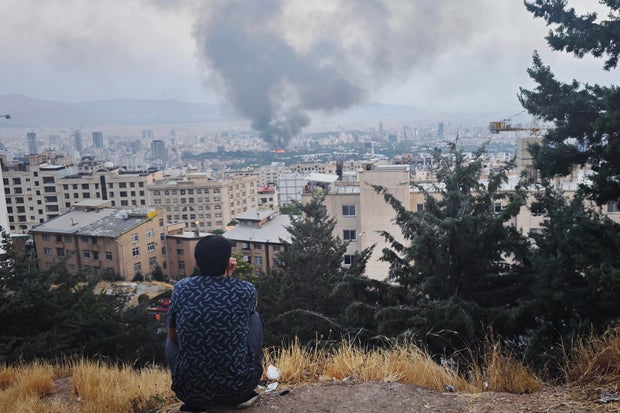In an escalating geopolitical crisis, President Donald Trump has articulated a firm stance against Iran’s nuclear ambitions, emphasizing the United States’ demand for a complete cessation of Tehran’s enrichment activities. The president’s comments came amidst ongoing hostilities between Iran and Israel, a conflict that has rapidly intensified, leading to significant casualties and geopolitical ramifications.
During an early Tuesday briefing aboard Air Force One, President Trump clarified his strategic goals regarding the troubling situation in the Middle East. He explicitly rejected the notion of seeking a mere ceasefire, stating, “I didn’t say I was looking for a ceasefire. We’re looking for better than a ceasefire.” This statement underscores a broader aim of not just pausing the hostilities but addressing the root cause of tension – Iran’s nuclear program.
The discussions surrounding Iran’s nuclear capabilities have been a point of contention for many years. The U.S. administration, under Trump’s leadership, has been vocal about its skepticism toward Iran’s intentions and activities concerning nuclear development, often criticizing past administrations’ approaches as too lenient or ineffective.
Adding to the tensions, on the same day, President Trump announced on Truth Social, a platform he frequently uses to communicate his policy perspectives directly to the public, that the U.S. had “complete and total control of the skies over Iran.” This bold claim followed an assertion by Israel’s military that it had assumed full control of the airspace over Tehran, showcasing a significant escalation in military operations. Trump praised the superiority of American military equipment in his posts, a recurring theme in his presidency that underscores his belief in American exceptionalism in military affairs.
The ongoing operations by Israeli forces in Iran have led to severe impacts on the ground. Reports indicate that Israel’s military endeavors have not only targeted Iran’s nuclear facilities but have also decapitated much of the Islamic Republic’s military leadership and crippled their operational capabilities. This aggressive strategy aligns with Prime Minister Benjamin Netanyahu’s description of the campaign as an existential battle for Israel, prompted by intelligence suggesting Iran’s rapid progression towards obtaining a nuclear weapon.
Despite the escalating military engagement, a previous assessment by Tulsi Gabbard, Director of National Intelligence, informed U.S. lawmakers that Iran was not actively building a nuclear weapon. Her statement highlighted that although discussions about nuclear capabilities had become more public within Iran, there was no definitive evidence pointing to an active nuclear weapons program. These conflicting assessments add another layer of complexity to the international dialogue about Iran’s nuclear ambitions and the justification for military actions against it.
Meanwhile, President Trump, during his discussions with the press on Air Force One, mentioned that the reason for his early departure from the G7 summit in Canada was to return to Washington D.C. to more effectively monitor and manage the unfolding situation in the Middle East from the White House Situation Room, suggesting that the situation required his immediate and undiverted attention. He expressed a preference for direct engagement over telephonic communications, which he views as potentially compromised.
On the diplomatic front, the situation remains tense, with suggestions that Iran had signaled readiness to discuss a new deal regarding its nuclear program in talks facilitated by intermediaries in Qatar and Oman. Despite this, the U.S. President noted that any diplomatic efforts would depend on the evolving circumstances, and his willingness to engage in negotiations seemed tempered by the ongoing military actions.
In the broader international context, Iran’s responses and the potential for wider regional conflict are matters of significant concern. Trump reassured that any attack on U.S. interests or allies, including U.S. forces in the region, would elicit a strong military response from the U.S., reflecting his administration’s stern stance on protecting national and allied security interests.
American officials and strategists continue to navigate a complex array of military, diplomatic, and humanitarian considerations as the conflict evolves. With both domestic and international eyes watching closely, the decisions made in the coming days will likely have lasting impacts on regional stability, international relations, and the global discourse surrounding nuclear non-proliferation.
In summary, President Trump’s approach to the Iran-Israel conflict is characterized by a decisive emphasis on ending Iran’s nuclear enrichment, a skepticism of diplomatic assurances previously given about Iran’s nuclear program, and a robust demonstration of military capability, all framed within a context of ensuring American and allied security. As the situation develops, the international community remains engrossed in the unfolding narrative, waiting to see the outcome of one of the most contentious geopolitical confrontations in recent times.









